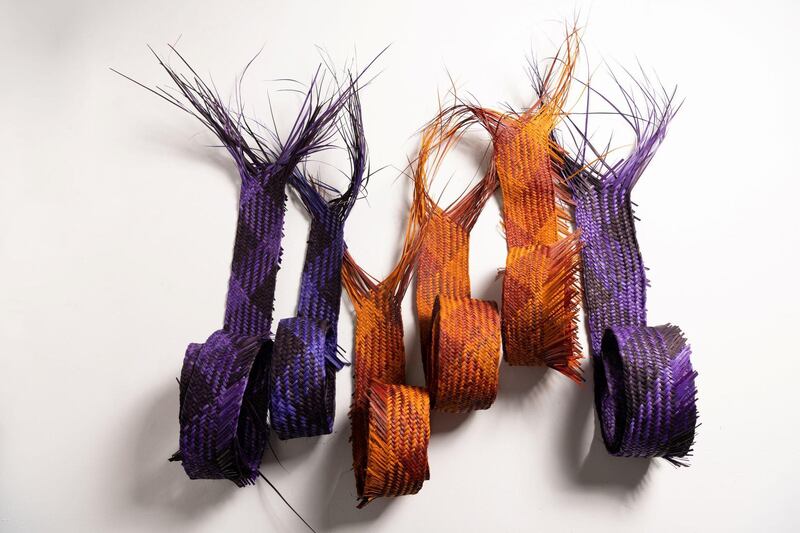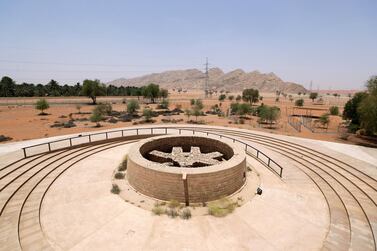Launched in 2003, London’s Design Festival has become an internationally renowned annual event bringing together the best designers, creative thinkers and craft practitioners the world has to offer. For nine days in September, the festival, which ended on Monday, attracts hundreds of thousands of visitors from 75 countries, ready to be inspired by groundbreaking products at the cutting edge of the global design movement.
When Reem bin Karam was asked whether the Sharjah crafts council she works for would like to represent the UAE as guest country of honour at the renowned design fair in Shoreditch, the heart of London's creative scene, she did a double take. "I asked the organisers: 'Are you being serious?'" Karam tells The National. "But then we realised what we're doing must be working."
For the director of Nama Women Advancement Establishment, who lives in Sharjah, the invitation is the result of years of hard work grounded on an unfaltering belief in the vision and talents of the UAE's craft practitioners. Irthi Contemporary Crafts Council was established as an affiliate of Nama under the patronage of Sharjah Ruler Sheikh Dr Sultan bin Muhammad Al Qasimi and is chaired by his wife, Sheikha Jawaher.
The making of Irthi Contemporary Crafts Council
It was Sheikha Jawaher who planted the seed that would flower into Irthi, inspired by a visit from an Emirati artisan in 2013. The woman had showed the Sharjah royal products that she had created herself. Impressed by the craftsmanship, the sheikha decided to set up an organisation that would support female artisans economically, and work towards preserving the UAE’s rich cultural heritage.
Nama’s international recognition at the London Design Fair is also part of the legacy that was left by Karam’s sister, Ameera, who died in a house fire in 2016. Before her death, Ameera ran another Nama affiliate, Sharjah Business Women Council, and Irthi was one of the pipeline projects she was working on, but never ended up seeing come to fruition.
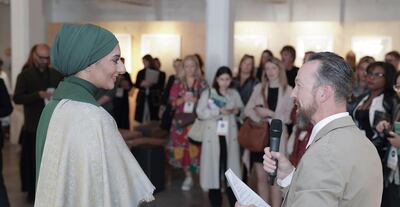
“It’s a sad story how I got into Nama,” Karam explains. “When my sister passed away, I was already involved from a distance with all the projects that they were doing. So when I was asked whether I would like to take over as director of Nama, it was a natural progression. Nama has a beautiful mission and I strongly believe in the work that we do.” Today, Irthi supports 37 artisans in developing their work and tapping into international market opportunities, promoting Emirati craftsmanship across the world.
Crafts Dialogue and Design Labs projects
The invitation to the London Design Fair also conveniently coincided with the launch of Irthi's first-ever original product line, which features 78 luxury products across 12 exclusive collections, focusing on home decor, furniture, jewellery, perfume bottles, handbags and more. These items have been created in collaboration with craft-makers from across the world – from Pakistan to Palestine – and are all handmade by female Emirati artisans employed by Irthi's Bidwa Social Development Programme, which is located in Dibba Al Hisn, a town in Sharjah.
The collections are the result of two projects: Design Labs and Crafts Dialogue. The former displayed eight collections at the London fair and were the creative result of Bidwa trainees partnering up with famous international artists and designers. For example, architect and designer Dima Srouji taught budding creatives the complex craft of Palestinian glassblowing to produce a collection of glass forms, including perfume and oud bottles, as well as midkhans (incense burners). Jennifer Zurick, an artist from Kentucky, also lent her decades of weaving knowledge to local trainees to create a range of sculptural handbags that were made using the traditional safeefah (palm-frond weaving) technique to braid strands of camel leather.
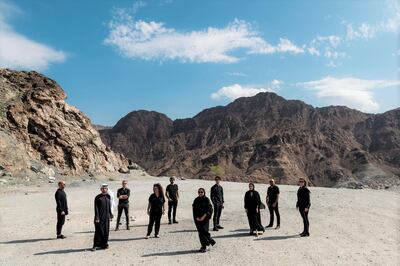
Meanwhile, the Craft Dialogues project, which featured four collections, is the result of a collaboration between Irthi and Creative Dialogue from Barcelona. In one stand-out collection, Fatima Al Zaabi worked with designer Matteo Silverio from Venice, to fuse Emirati clay with Italian murano glass and make a vase, lamp and phone charger. While this type of glass is known for being famously fragile, the design is built to withstand breakages. In fact, the creatives were so confident in their creations' durability that they placed them on a thin table at the London event.
'The UAE is very cosmopolitan'
“We tried to mix both cultures, getting Emirati designers to work with up-and-coming international designers where you’re using different materials with the same technique to build a product,” Karam explains. The use of the two materials from different parts of the world is all part of Irthi’s global outlook and the marketing strategy for its products. To ensure Emirati craftsmanship not just survives but flourishes in years to come, Irthi must appeal to a younger generation of UAE designers and buyers, adds Karam.
“The UAE is very cosmopolitan and the young Emiratis of today have grown up with an international perspective. I use English more than I use the Arabic language and that’s applicable to more than half of the population, in particular the young.
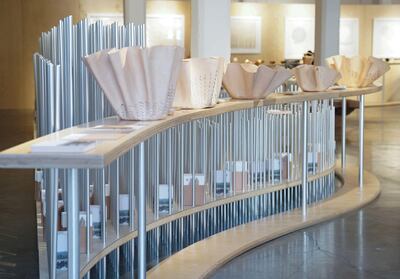
“With the product line, we wanted to introduce Emirati art to the younger generation because we have a lot of dying crafts that we’re trying to revive. We want to make it more viable for both their own taste and the international market at the same time.”
Putting Sharjah women on the map
Irthi is one of three affiliates of Nama, alongside Sharjah Business Women Council and the Badiri Education and Development Academy. The three institutions were created to improve the societal and economic elevation of women in both Sharjah and the wider UAE. Karam credits Sheikha Jawaher’s commitment to empowering women for the success of the movement. “Her Highness always had a vision. I think it is her drive, to put Sharjah women on the map and take the women’s movement to another level internationally, to change mindsets about how the Arab or Emirati woman is perceived.”
While Nama’s projects have the generous backing of the Sharjah government, the goal is that Irthi will be able to fully support itself financially in future. Karam believes the key to continued success is to keep innovation at the forefront of the craft council’s work. “We’re looking at sustainability because we want this project to fund itself, so that even if we’re not here it will work. We can’t build a council and then have it die after a few years. We’re looking at each segment of the council and giving it its right amount of research. We’re continuously researching and experimenting to ensure it lasts.
“We always say at Nama that change is the only constant. And I think that’s the only thing that’s going to be constant for Irthi.”
